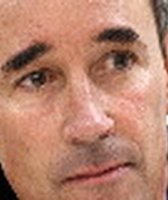Stand up for the facts!
Our only agenda is to publish the truth so you can be an informed participant in democracy.
We need your help.
I would like to contribute
Ken Plum says Pre-K education leads to less crime and welfare
Del. Ken Plum, D-Fairfax, recently renewed his call on Virginia to invest more money in preschool education.
During a cable television discussion in Reston, Plum said, "We’ve got 40 years of study now that show that, with a good preschool start, you’re less likely to be on public dole. You’re less likely to be in prison. You’re much more likely to be a good productive citizen.That money spent up front saves money in the long haul."
The value of a preschool education is a hot topic among early childhood education experts, gaining steam in 2013 when President Barack Obama proposed expanding publicly funded programs to include all 4-year-olds who come from low and moderate-income families. Much of the research has focused on whether preschool provides lasting gains in the thinking and social skills of low-income children.
Plum’s statement focuses on a narrower area of study -- whether participation in a quality preschool program lowers the likelihood that a person will wind up in prison or on welfare. We examined Plum’s assertion that it does.
State and federal preschool programs provide instruction for more than 2 million children aged 3 and 4 nationwide, according to the National Institute for Early Education Research at Rutgers University. The federal Head Start program is only available to children living below the poverty line. Most states, including Virginia, fund programs for children from low-income homes with earnings above the poverty line.
Ypsilanti
Plum backed his statement by referring us to a widely cited study that tracks the lives of 123 low-income black children who lived in an elementary school district in Ypsilanti, Mich., in the 1960s.
The children were randomly divided into two groups -- one that attended a high quality preschool program and another group that didn’t enroll in any preschool program. In 2005, the HighScope Educational Research Foundation issued a follow-up report on the students, who had reached age 40.
Researchers concluded that those "who had the preschool program had higher earnings, were more likely to hold a job, had committed fewer crimes and were more likely to have graduated from high school than adults who did not have preschool."
The report found that 28 percent of those who went through the program were sentenced to jail or prison, compared to 52 percent of those who didn’t attend. The study also noted that the students who went through the program had fewer criminal arrests than peers who weren’t enrolled.
The difference was less stark when it came to comparing the use of welfare and other social programs. The study found that 71 percent of the program’s students were on the dole at some point in their adult lives, compared to 86 percent who hadn’t attended preschool. Researchers said the distinction "was not significant."
Chapel Hill
Another ongoing study of a high quality pre-K program is the Abecedarian Project at the University of North Carolina. It began in the 1970s, tracking 111 low-income black children ranging in age from 0 to 5. The children were split into two groups: those who ultimately attended the preschool program, and those who did not.
In 2012, researchers interviewed members of the sample, who were now 30. They found that those who didn’t attend the program were six times more likely to have received welfare benefits for at least nine months between the ages of 22 and 30.
But unlike the Ypsilanti study, the North Carolina researchers found little difference between the two groups when it came to crime. Among those who didn’t go through the program, 28.6 percent reported having had a criminal conviction by age 30. Of those who did go to preschool, 27.5 percent said they had a criminal conviction.
The Michigan and North Carolina studies are often cited by researchers to prove that high quality preschool programs lead to better life outcomes and end up paying for themselves in the long run.
But critics note that the programs in Ypsilanti and Chapel Hill were small, intensive initiatives that spent much more per student than typical state-run preschool programs and therefore, shouldn’t be generalized beyond the communities they served. Both programs, for example, allowed students to have more than one year of preschool while most states -- including Virginia -- offer only a single year of pre-K.
Russ Whitehurst, a senior fellow at the Brookings Institution, said people often make generalizations on the long-term effects of preschool based mainly on the results of the Ypsilanti study.
"This is a very risky generalization to today’s programs from a small study done 40 years ago," Whitehurst told us.
Whitehurst, the former director of the Institute of Education Sciences at the U.S. Department of Education, wrote in a 2013 paper for Brookings that "the circumstances of the very poor families of the black children who were served by these model programs 30-40 years ago are very different from those faced by the families that are presently served by publicly funded preschool programs." He noted that the Ypsilanti and Chapel Hill programs didn’t include any Hispanic students, who make up nearly half of the 4-year-olds enrolled in the federal Head Start program.
But Larry Schweinhart, lead researcher of the Ypsilanti study, said in a 2004 statement that the results they discovered could transport to other publicly funded programs -- as long as they embraced the same type of high-quality program as Ypsilanti’s.
Chicago
Many researchers who believe in the long-term impact of preschool point to a study of 1,500 low-income children who attended 20 Chicago Child-Parent Centers at public schools during the 1980s. Two-thirds of the children went through the program and the rest did not. Researchers have tracked the students’ life experiences ever since.
We contacted Arthur Reynolds, a University of Minnesota professor who was the lead author of the report. He said researchers concluded that the preschool graduates, by the time they reached their mid-20s, had a 20 percent lower rate of incarceration than those who didn’t go through the program.
"Preschool graduates also had a more stable employment history and were more likely to attend a 4-year college. This is associated with higher wages that would increase tax revenues and lessen public aid receipt," Reynolds emailed.
Our ruling
Plum said, "We’ve got 40 years of study now that show that, with a good preschool start, you’re less likely to be on public dole. You’re less likely to be in prison."
Three major studies on the issue vary in their results but provide a basis for Plum’s contention. Two of the three studies showed that preschool students were less likely to be incarcerated as adults than those who were not enrolled. All three studies suggested pre-K children were less likely to go on the public dole as adults, although the Ypsilanti study was more equivocal about that conclusion.
The variations in the reports underscore that the linkage between pre-K and successful citizenship is not as ironclad as Plum suggests. Analysts debate whether the results from the three local programs studied would extend to other preschool initiatives across the county.
With those clarifications in mind, we rate Plum’s claim Mostly True.
Our Sources
Comcast Channel 28, "Virginia Report," March 2015. (Plum’s statement is just over 17:30 into the video).
Email from Del. Ken Plum, March 11, 2015.
HighScope Perry Preschool Study, "Lifetime effects: The HighScope Perry Preschool study through age 40," 2005.
The High/Scope Perry Preschool study, 2005.
Interview with David Armor, professor emeritus of public policy at George Mason University, March 16, 2015.
Email from Arthur Reynolds, professor at the University of Minnesota, March 19, 2015.
Interview with Russ Whitehurst, senior fellow at the Brookings Institute, March 18, 2015.
Email from Kirsty Brown, spokeswoman for the National Institute for Early Education Research at Rutgers University, March 11, 2015.
Interview with Kirsty Brown, March 11, 2015.
The Cato Institute, "The evidence on universal preschool," Oct. 15, 2014.
Institute for Education Sciences, "Benefits, costs, and explanation of the High/Scope Perry Preschool Program," April 2003.
National Institute for Early Education Research, "Long-term studies show lasting gains from Pre-K," accessed March 13, 2015.
Coalition for Evidence-based Policy, "Perry Preschool Project," accessed March 13, 2015.
Coalition for Evidence-based Policy, "Abecedarian project," accessed March 13, 2015.
Coalition for Evidence-based Policy, "Do early childhood intervention programs really work?" April, 2003.
Brookings Institution, "New evidence raises doubts on Obama’s proposal on preschool for all," Nov. 20, 2013.
Brookings Institution, "Can we be hard-headed about preschool? A look at Head Start," Jan. 16, 2013.
Brookings Institution, "Can we be hard-headed about preschool? A look at universal and targeted Pre-K," Jan. 23, 2013.
The New York Times op-ed by University of Virginia professors Daniel T. Willingham and David W. Grissmer, Jan. 29, 2014.
Cato, "Pre-K Pushers peddling patent prevarications," July 14, 2008.
Child Development, "Age 26 cost-benefit analysis of the Child-Parent Center Early Education Program," January/February 2011.
Teachers College Record, "Meta-analysis of the effects of early education interventions on cognitive and social development," March 2010.
Investing in Kids, "Brookings article provides for high benefit-cost ratios for state pre-K, but you wouldn’t know it from the article,"June 19, 2013.
Investing in Kids, "What does the evidence show on preschool?" Oct. 16, 2014.
Emails from Charles Pyle, spokesman for the Virginia Department of Education, March 11-12, 2015.
Virginia Department of Education, "Virginia Preschool Initiative," Jan. 13, 2015.
Education Week, "Do some preschool studies oversell the benefits of early education?" Aug. 1, 2013.
Teachers College Record, "Meta-analysis of the effects of early education interventions on cognitive and social development," March 2010.
Investing in Kids, "Brookings article provides for high benefit-cost ratios for state pre-K, but you wouldn’t know it from the article,"June 19, 2013.
Investing in Kids, "What does the evidence show on preschool?" Oct. 16, 2014.
FactCheck.org, "Obama’s preschool stretch," Feb. 20, 2013.
San Jose Mercury News, "Deborah Stipek: Benefits of preschool are clearly documented," Aug. 6, 2013.
Education Week, "Consensus on early ed value, but policy questions remain," Jan. 2, 2015.
Education Next, "The pre-K problem: A great investment or passing the buck?" Feb. 20, 2014.
Education Week op-ed by David Armor, professor emeritus at George Mason University, "The basis for expanding pre-K is weak," Jan. 8, 2015.
FactCheck.org, "Obama’s preschool stretch," Feb. 20, 2013.
The American Enterprise Institute, "Closing the gaps in health outcomes: Alternative paths forward," July 21, 2014.
Developmental Psychology, "Adult outcomes as a function of an early childhood educational program: An Abecedarian project follow-up," Jan. 16, 2012.
The Brookings Institution, "Cost effective investments in children," January, 2007.
National Institute for Early Education Research, "The State of Preschool 2013," accessed March 17, 2015.
National Institute for Early Education Research, "Preschool education and it’s lasting effects: Research and Policy implications," September, 2008.
Augusta Free Press, "Ken Plum: U.S. Chamber recommendation," May 13, 2011.
PolitiFact Virginia, "Tim Kaine says pre-kindergarten program expanded 40 percent when he was governor," March 11, 2012.
U.S. Department of Health and Human Services, "Head Start Facts Fiscal year 2013," accessed March 19, 2015.
U.S. Department of Education, "Early learning: America’s middle class promise begins early," accessed March 19, 2015.
University of North Carolina, "The Carolina Abecedarian Project," accessed March 19, 2015.
The Robert Wood Johnson Foundation, "Landmark study shows early childhood development pays dividends for decades," accessed March 19, 2015.
The Washington Post, "Why conservatives should get behind Obama’s push for universal pre-K," Feb. 2, 2015.
Browse the Truth-O-Meter
More by Sean Gorman
Ken Plum says Pre-K education leads to less crime and welfare
Support independent fact-checking.
Become a member!
In a world of wild talk and fake news, help us stand up for the facts.

















































